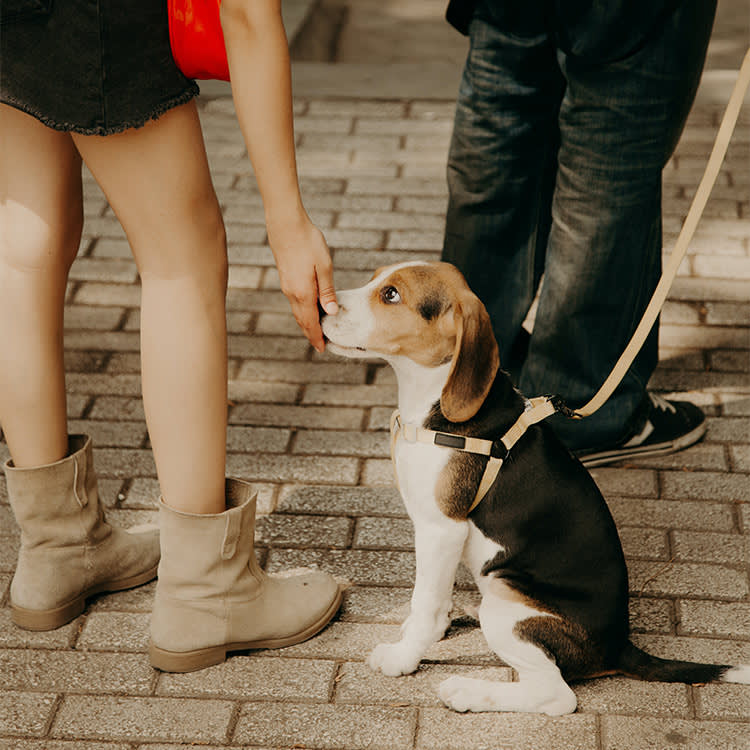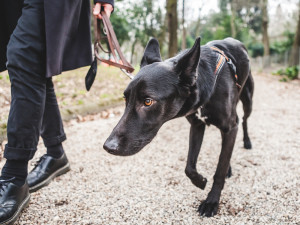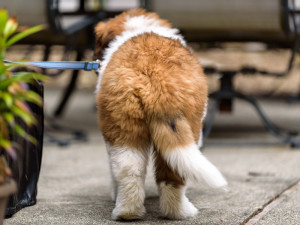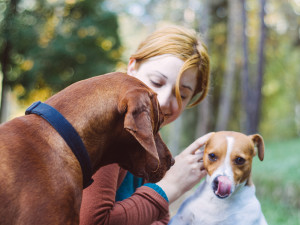Are Dogs Good Judges of Character?
Dogs show a bias against unhelpful people.

share article

Your pet wants you to read our newsletter. (Then give them a treat.)
“If your dog doesn’t like someone, you probably shouldn’t either” is a popular expression, reflecting the general view that dogs are good judges of character. But are they? Multiple studies have found that dogs are keenly aware of the behavior of those around them. Baddies beware because dogs don’t like mean people — and even a bribe won’t change their minds.
Can dogs sense a person’s character?
Years ago, I had just moved to a small town and was eager to meet other people. When I stopped on the street to talk to my neighbor for the first time, my dog unexpectedly stiffened. Though this man approached my dog gently, my dog backed away and refused to interact at all. It was embarrassing. My dog’s behavior was off-putting and felt like a social setback.
Later, when I mentioned this interaction to the family who owned the house I was renting, they weren’t surprised. They told me that everyone in town knew he was mean. After warning me to be careful, they shared stories about his history of violence, specifically towards his ex-wife and children, and also towards other people in town. I later learned further unsavory details about him, which was offputting because the man seemed friendly enough during our brief encounter. My dog seems to have had the proper reaction to my neighbor immediately, even though I did not. There have been several studies about how dogs make social and emotional evaluations of people that can provide some insight into how dogs judge a person’s actions. They can even smell human emotionsopens in a new tab.
Dogs notice if you’re being unhelpful
In one study, scientists evaluated dogs to investigate how they would respond to people after watching them be helpful or refuse to help other people. In the experiment, the person pretending (for the sake of science) to be in need of help was the dog’s person. The dog watched as their person attempted to open a container while two strangers sat on either side of them.
In one scenario, the dog’s parent would turn to one of the people next to them and hold out the container, where they would be assisted by a “helper.” In another instance, the person asked to help would respond by turning away, clearly not giving assistance, leaving the pet parent to continue with the unsuccessful attempts to open the container. In the third group (the control), the pet parent did not solicit help and didn’t interact with either person. The third person in all groups remained neutral, neither helping nor refusing.
At the end of each of these role-playing situations, both strangers offered the dog treats. After seeing their person helped, dogs were equally likely to take the treat from either stranger. However, when there was a refusal to help, dogs chose to avoid taking treats from people who were not helpful. Similar results were found in capuchin monkeys, and the same pattern is well known to occur in children.
According to the researchers, this is the first study to show that dogs make social and emotional evaluations of people regardless of what they had to gain. If the pups were acting solely out of self-interest, there would be no differences, meaning an equal number of dogs would have accepted food from each person. It is interesting that the dogs in this study act as though they assume that people are okay and trust them — until they have evidence to the contrary.

Karen B. London, PhD, CAAB, CPDT-KA
Karen B. London, Ph.D., is a Certified Applied Animal Behaviorist and Certified Professional Dog Trainer who specializes in working with dogs with serious behavioral issues, including aggression, and has also trained other animals including cats, birds, snakes, and insects. She writes the animal column for the Arizona Daily Sun and is an Adjunct Professor in the Department of Biological Sciences at Northern Arizona University. She is the author of six books about training and behavior, including her most recent, Treat Everyone Like a Dog: How a Dog Trainer’s World View Can Improve Your Lifeopens in a new tab.
Related articles
![Mixed dog laying on the floor int he sun with an unsure look on her face]() opens in a new tab
opens in a new tabDecoding Your Dog’s Growls
When your dog growls, they’re expressing their emotions. A study found that you’ll likely be able to understand what they’re feeling.
![Shy black dog walking with owner at the park.]() opens in a new tab
opens in a new tabHow to Help an Anxious Dog Conquer Their Fears
Six animal behaviorists and I share our pro tips for boosting the confidence of a fearful dog.
![Back view of Saint Bernard puppy tail]() opens in a new tab
opens in a new tabIs Your Dog a Lefty or a Righty?
Your dog’s wag and paw preference say a lot about their personality.
- opens in a new tab
Can Your Dog Get Jealous?
Turns out, they can experience pretty complex emotions.




